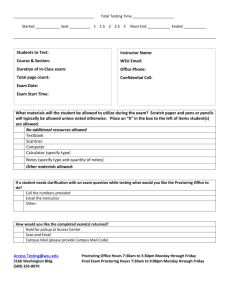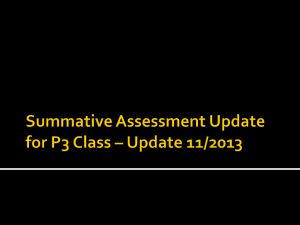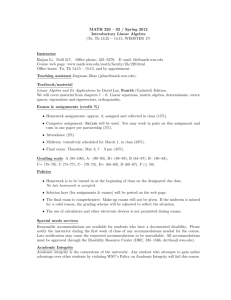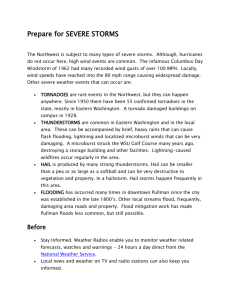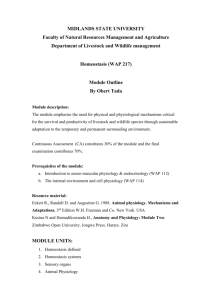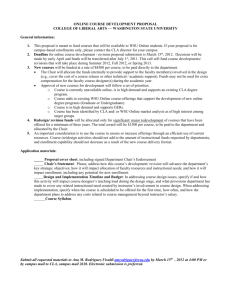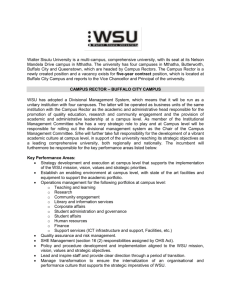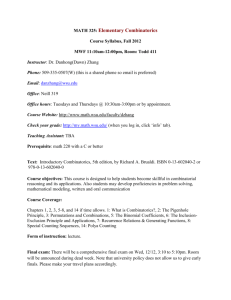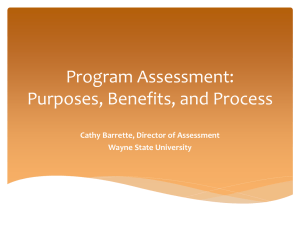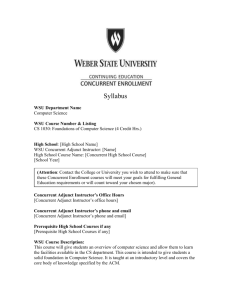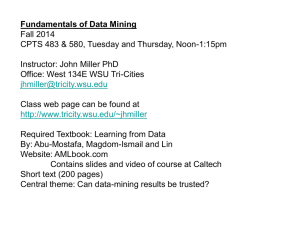Biol 353 Mammalian Physiology
advertisement
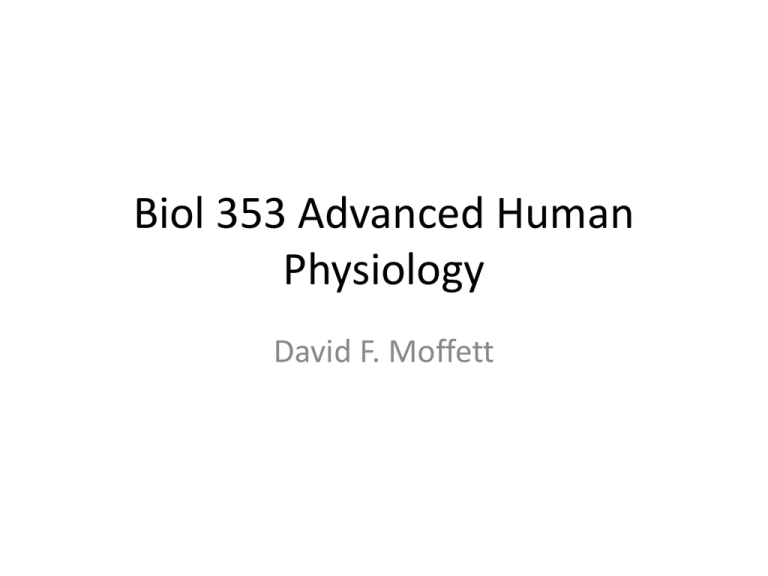
Biol 353 Advanced Human Physiology David F. Moffett What is physiology? • Physiology is the science of how animals work. In this course, we concentrate for the most part on the integrative and systemic aspects of body function. • Although the topics will be presented largely from the point of view of the human organism, the processes to be described apply quite largely to all mammals – indeed a great part of the knowledge of how the human body works is derived from studies using the rat, the cat, the rabbit and the dog as animal models. • The mammalian body is the most complex fully-integrated system known. This complexity presents a challenge for investigators and clinicians as well as students. Complex integrated systems and homeostasis • Homeostasis of the internal environment – a concept advanced by the late 19th century French physiologist Claude Bernard - means regulated stability • Body temperature, blood pressure, and volume and composition of extracellular fluid are systemic variables regulated by coordinating the responses of multiple organ systems. Much of the course will be directed at how integrated systems cooperate to accomplish homeostasis. Course Materials • Since you will be able to download all of the relevant lecture graphics from the course website at www.sbs.wsu.edu/biol353/, there is no need for a separate text. If you cannot be happy without a text, the one I like best is by Boron and Boulpaep (Saunders). The most recent edition is expensive as a new book, but used copies can be bought from Amazon.com. • Likewise, you will be able to download laboratory instructions from the course website, so you don’t have to purchase a lab manual. Contacting the instructor • Call 5-8122 – if you leave a message, please include your name and telephone number. • Email at dfmoffett@gmail.com. Keep in mind that I may not check this account during evening or weekend hours. • If you need face time with me, contact me by one of these methods or after class; we can schedule a mutually convenient time. Also, please note that I will be available to meet with students each Friday during the 2:00-3:00 PM hour at the downstairs lounge in Cleveland Hall. • For issues having to do with the laboratory part of the course, your first recourse is usually the instructor in charge of your section. This person will give you contact information at the first meeting of your lab section. Tests and Grading • There will be three hour tests more or less evenly spaced through the semester; these and the 3-hour final exam will account for 60% of your grade. • The remaining 40% is based on 5 written laboratory reports and a written evaluation by your laboratory instructor. • Letter grades will be awarded on the basis of the distribution of final scores. An estimate of where you stand letter-grade-wise will be provided after each hour test and the accuracy of this prediction will grow with each hour test. • As a rule, the median score will be the line of division between the lowest B- and the highest C+, so ½ of the class will be likely to receive a grade of B- or higher. Some rules • Makeup tests are possible in case of an illness as recognized by your doctor, a family emergency as recognized by the Dean of Students, or a WSU-sponsored activity. They will not necessarily replicate the format of the regular tests. • Please note that an hour test is scheduled on the Friday before Spring Break – this is more or less dictated by the way the semester cookie crumbles when you try to break it into 4 pieces. Make your spring-break travel plans accordingly. • Laboratory reports are due at the beginning of the lab meeting on the day indicated in the syllabus. Alternative arrangements must be made with your TA in advance. Your TA has the option to refuse late work that arrives without a prior agreement. Laboratory • The laboratory experience is centered around surgical experiments using the rabbit as the animal model. • These exercises have been repeatedly approved by the WSU Institutional Animal Care and Protection Committee. The WSU Campus Veterinarian provides training and consultation for the teaching staff who oversee these exercises. • The animals to be used are purpose-reared and have not been anyone’s pets. • Many students are looking forward to the opportunity to carry out these exercises; others will feel some trepidation. If you are one of the latter, please leave yourself open to the possibility that these will turn out to be important learning experiences. Important University Announcements • Students with disabilities: Reasonable accommodations are available for students with a documented disability. If you have a disability and may need accommodations to fully participate in this class, please visit the Access Center. All accommodations MUST be approved through the Access Center (Washington Building, Room 217). Please stop by or call 509-335-3417 to make an appointment with a disability specialist. • Safety on campus: Washington State University is committed to maintaining a safe environment for its faculty, staff, and students. Every member of the campus community should recognize that safety is a shared responsibility and that each of us has a personal role in campus safety. All faculty, staff, and students should know the appropriate actions to take when an emergency arises. The administrators ask that all faculty, staff, and students visit the University emergency management web site at http://oem.wsu.edu/emergencies to become familiar with the student and classroom emergency information provided. Academic Integrity and Professionalism • Many of you will enter professions or positions of responsibility that carry an ethical obligation, so learning professionalism is part of your education. The following are a couple of important aspects of professionalism that apply to this course. • All work that you submit is your own. • The value of every person is respected. A little about the instructor • David F. Moffett grew up in North Carolina, so he still talks a little funny. • He is a graduate of Duke University and the University of Miami. • He completed postdoctoral training at Duke University Medical Center. • He has been a visiting professor at the University of Texas Medical Branch – Galveston and at the University of Alberta – Edmonton. • He is the author of more than 60 journal articles and review chapters and two textbooks. • His current research on the physiology of mosquitoes is funded by the NIH. • He and his wife and son are the proprietors of Wawawai Canyon Winery
